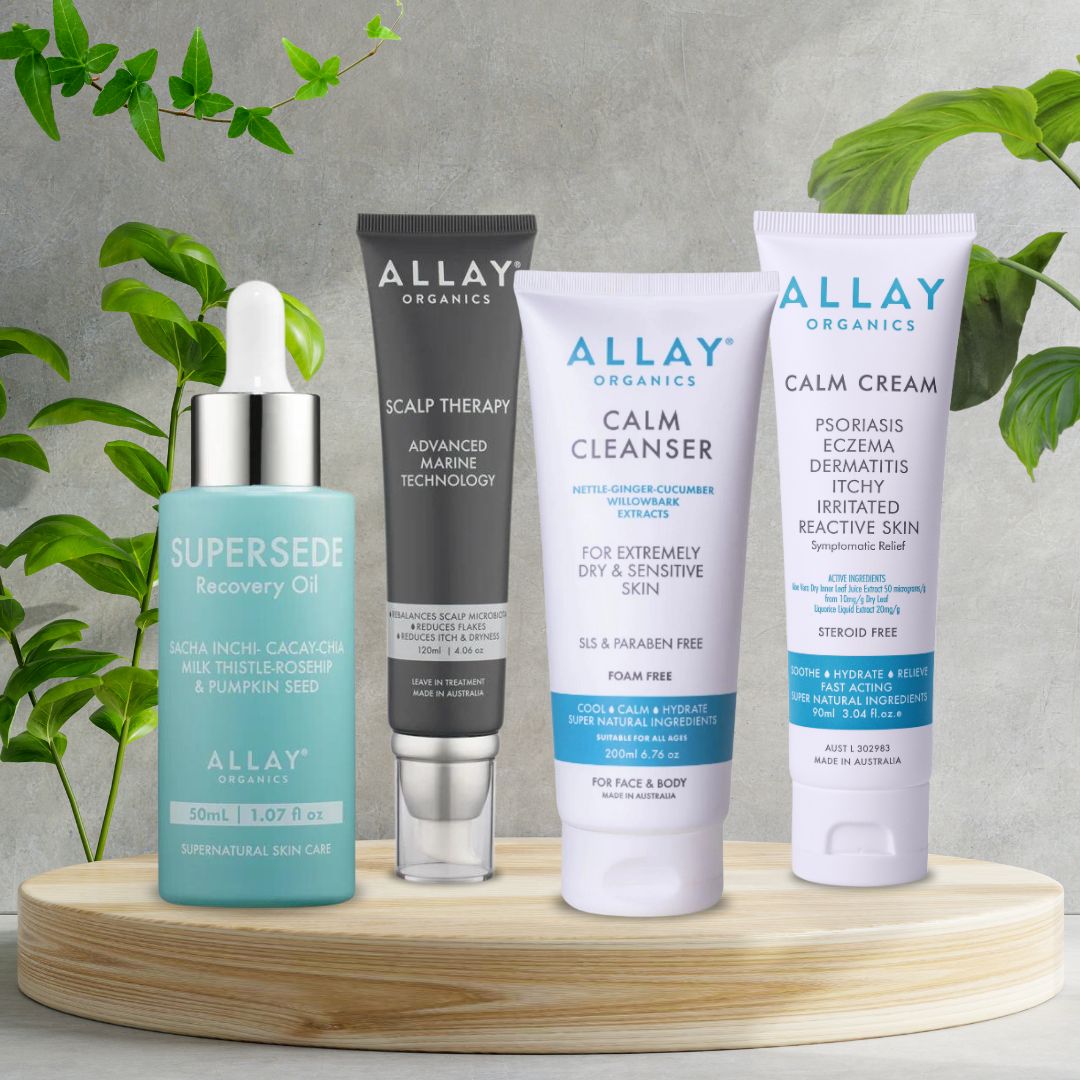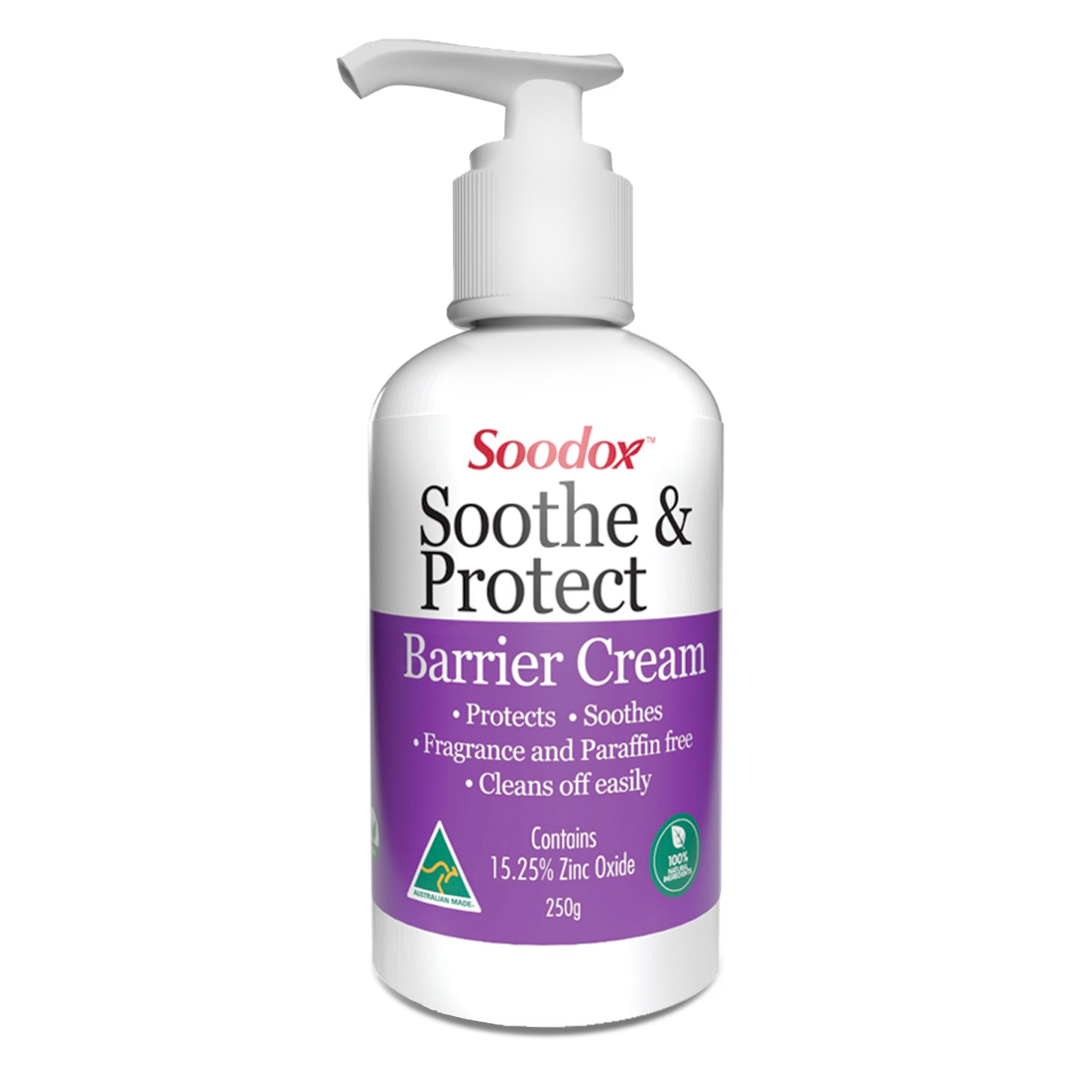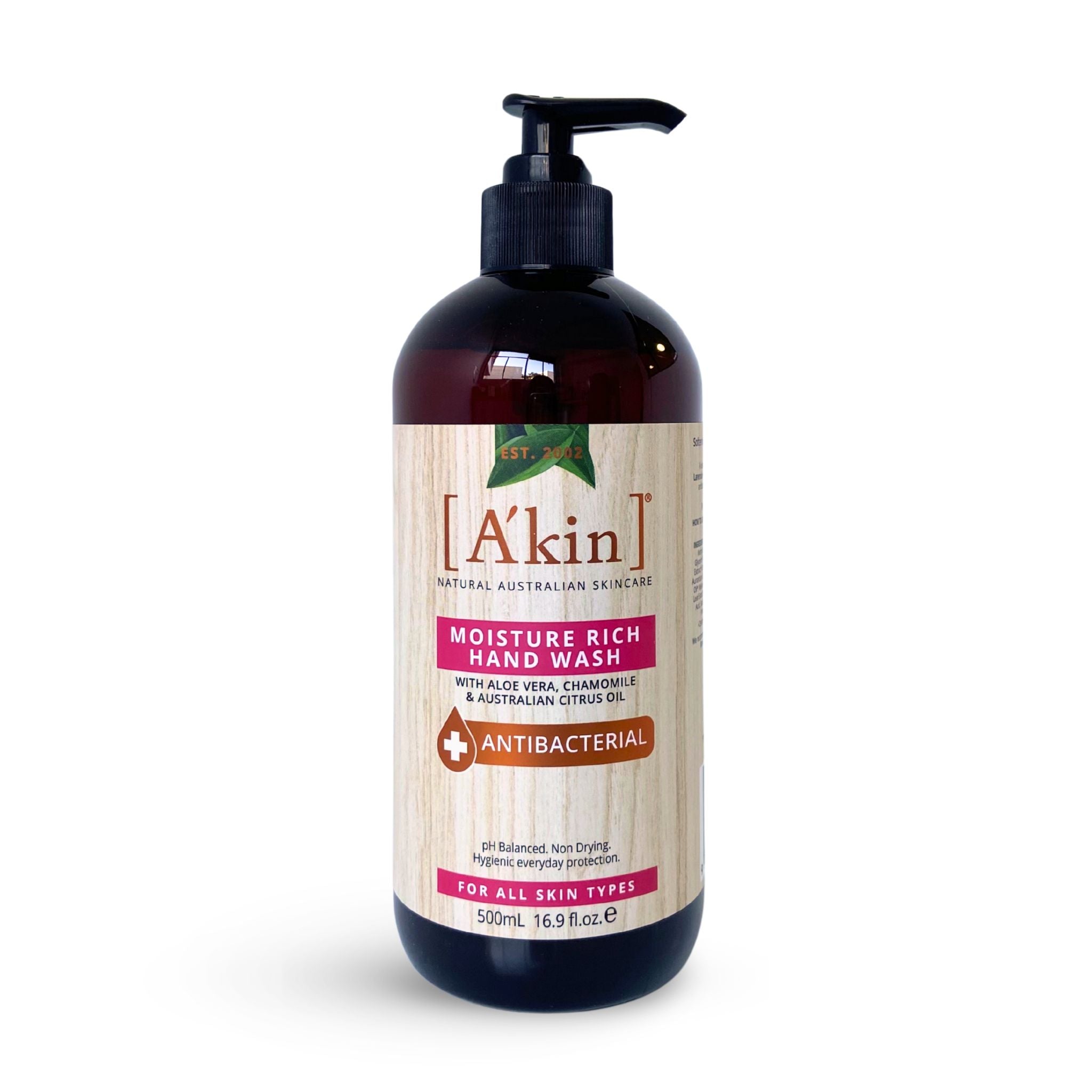
Is Your Dry Skin a Sign of a Vitamin Deficiency?
, by Tatianna Gerard, 23 min reading time

, by Tatianna Gerard, 23 min reading time
You’ve switched moisturisers. Tried heavier creams. Maybe even blamed the weather. But your skin’s still dry, flaky, or just not feeling right. Sound familiar?
But here’s something that’s often overlooked: dry skin isn’t always caused by what you’re putting on your body — sometimes, it’s about what your body might be missing. Your body needs certain vitamins and nutrients to keep your skin hydrated and healthy. When those levels dip, your skin is often the first to notice.
Let’s take a look at the vitamin deficiencies that could be drying out your skin — and how to support it from within.
We often focus on what goes on our skin — like moisturisers and serums — but the building blocks for healthy, hydrated skin actually start inside. Your skin is constantly regenerating, defending itself, and responding to environmental stress. To do that well, it relies on a steady supply of nutrients that help it stay strong, smooth and supple.
If you’re missing some of those key nutrients, dry skin can be one of the first signs. Let’s take a look at the vitamins and nutrients most closely linked to skin hydration and repair — and what happens when your body doesn’t get enough of them.
Vitamin A plays a vital role in skin cell turnover — the process your skin uses to shed old cells and produce new, healthy ones. It also supports sebum production, your skin’s natural oil, which keeps it soft and moisturised.
When your vitamin A levels are low, that turnover slows down. Skin may start to feel rough, dry, or flaky, especially on areas like the arms and legs. It may also take longer for small wounds or irritation to heal.
Deficiency signs:
Where to get it:
Often called the “sunshine vitamin,” vitamin D helps regulate skin barrier function and supports the skin’s immune response — helping to reduce inflammation and irritation. It plays a subtle but essential role in maintaining the hydration and structure of your skin.
People with low vitamin D levels often experience skin that’s itchy, flaky, or reactive. Deficiency has also been linked to inflammatory skin conditions like eczema and psoriasis.
Deficiency signs:
Where to get it:
Vitamin E is a powerful antioxidant that protects skin cells from damage caused by environmental stress (like UV exposure or pollution). It also helps the skin retain moisture by strengthening the outer layer of the skin — preventing water loss.
Vitamin E works especially well in combination with other skin nutrients like vitamin C. Without it, the skin may struggle to stay hydrated and becomes more vulnerable to dryness and irritation.
Deficiency signs:
Where to get it:
Vitamin C is essential for the production of collagen, which provides structure, firmness, and elasticity to your skin. It’s also a key antioxidant, helping protect the skin from free radicals that can cause dryness and inflammation.
Without enough vitamin C, your skin may appear dull, sagging, or fragile, and may not heal properly. Even mild deficiencies can result in dryness or increased irritation.
Deficiency signs:
Where to get it:
Omega-3 fatty acids help maintain the lipid barrier of your skin — this is the part that keeps moisture in and irritants out. When omega-3 levels are low, skin may lose hydration more quickly, become inflamed, or show signs of cracking and discomfort.
These fats also help calm inflammation from the inside, making them especially beneficial if your dry skin is also red, itchy, or eczema-prone.
Deficiency signs:
Where to get them:
Zinc is a trace mineral that supports skin healing, inflammation control, and barrier function. It helps regulate oil production, supports the immune system, and plays a key role in repairing skin after damage.
Even a mild zinc deficiency can lead to patchy dryness, acne-like breakouts, or slower healing — particularly if your skin is already irritated from friction or external stressors.
Deficiency signs:
Where to get it:
Everyone’s body is different — and so are their nutrient needs. If you suspect you might be low in one of these key skin-supportive nutrients, consider speaking to a healthcare professional or doing an at-home test before self-supplementing.
You might be eating well, staying active, and taking good care of your skin — so it can be frustrating to find out you’re low in a vitamin or nutrient your body really needs. But the truth is, nutrient deficiencies are more common than most people realise — and they’re not always about what you’re eating (or not eating).
Here are some of the most common reasons your body might be running low on the vitamins and minerals that support skin health:
If you follow a vegan, vegetarian, dairy-free, or gluten-free diet, you may be more at risk of falling short on certain nutrients — especially vitamin A, vitamin D, zinc, or essential fatty acids. That doesn’t mean these diets are unhealthy — just that they sometimes require more careful planning or supplementation to fill the gaps.
For example:
Even if you’re eating a varied, nutrient-rich diet, certain health conditions can interfere with absorption — meaning your body isn’t fully taking in or using what you consume. This is common with:
These conditions can damage the lining of the gut, making it harder to absorb fat-soluble vitamins (A, D, E) and minerals like zinc and iron — which can have visible effects on your skin over time.
Your skin creates vitamin D when exposed to sunlight — but many of us don’t get enough sun, especially during winter, if we work indoors, or if we wear protective clothing (or sunscreen, as we should!). People with darker skin tones also produce vitamin D more slowly and may be more likely to experience deficiency.
Low vitamin D is incredibly common, and one of the first signs can be persistent dry, irritated, or inflamed skin.
As we age, our bodies become a little less efficient at absorbing nutrients. Older adults often produce less stomach acid, which plays a role in breaking down and absorbing certain vitamins and minerals. Ageing skin is also more prone to dryness, so nutritional support becomes even more important to maintain hydration and resilience.
If you’re under long-term stress or managing a chronic health condition, your body may burn through certain nutrients faster — or prioritise them elsewhere in the body. Vitamins like C, E, and zinc are particularly impacted during times of physical or emotional stress, which can show up as dull, dry, or irritated skin.
Let’s be honest — it’s not always easy to eat a perfectly balanced diet, especially with a busy lifestyle. Skipping meals, relying heavily on processed foods, or avoiding entire food groups can all lead to small but significant nutrient gaps over time.
Even if you’re not “deficient” in the clinical sense, being consistently low in certain vitamins and minerals may still affect your skin’s ability to stay hydrated, protected, and smooth.
You don’t need to feel guilty or stressed if your diet or lifestyle has gaps — most people have something they could improve. The good news is that once you know what your body’s missing, it’s much easier to make targeted changes that support your skin (and your overall health) in the long run.
If you suspect your dry skin might be linked to a nutrient deficiency, it’s natural to wonder: Should I just start taking a supplement?
The answer? It depends. While supplements can play a valuable role in restoring balance — especially if your levels are genuinely low — the first and most important step is understanding what your body actually needs.
Ideally, we should get most of our vitamins and minerals from food. Whole foods offer not only the nutrient itself, but also a wide range of co-factors that help our bodies absorb and use those nutrients effectively.
But let’s be real — even with a healthy diet, there are times when food alone might not meet your needs. That includes:
In these cases, a well-chosen supplement may help fill in the gaps, especially if you’re showing signs of deficiency like persistent dry skin, fatigue, or poor wound healing.
Vitamins A, D, E, C, zinc, and omega-3s are all available in supplement form, and many are combined into skin or immunity support blends. But taking high doses “just in case” can sometimes do more harm than good — especially with fat-soluble vitamins like A and D, which are stored in the body and can accumulate to unsafe levels over time.
Read more: Can You Have Too Much Vitamin D? What You Need to Know About Safe Supplementing
That’s why it’s best to approach supplementation with informed guidance, either from a healthcare provider or by testing your levels first.
Before you add another bottle to your shelf, consider finding out where your levels actually stand. A simple blood test — either through your GP or an at-home test kit — can help you identify if you’re truly low in nutrients like vitamin D, iron, or zinc. From there, you can make targeted decisions that are better for your body and your skin.
Shop general health rapid antigen tests for home use at Aussie Pharma Direct.
If you’re unsure whether a supplement is right for you, or what dosage to take, speak to your GP, pharmacist, or a qualified nutritionist. They can help you interpret your results and recommend a supplement that’s appropriate for your age, health conditions, and lifestyle.
Wondering if you’re low in vitamin D, zinc, or iron — but not keen on scheduling a blood test or waiting weeks for results? You’re not alone. That’s where at-home nutrient testing kits come in.
These easy-to-use tools make it possible to get a clearer picture of what your body might be missing — all from the comfort of your own home.
At-home test kits are simple diagnostic tools that allow you to check specific nutrient levels using just a small sample of blood, usually from a quick finger prick. They come with step-by-step instructions, and results can be ready in minutes — or sent to a lab for analysis, depending on the type.
Some of the most commonly available and helpful tests include:
These are especially useful if you suspect a deficiency is behind symptoms like persistent dry skin, low energy, or poor immune health. The test kits are also handy if you’re managing existing health conditions and are monitoring your levels occasionally.
Why test at home?
At-home testing gives you a head start on making informed, targeted choices, rather than guessing and hoping for results.
A quick reminder:
At-home tests are a great screening tool, but they’re not a replacement for medical advice. If your results are low — or if your symptoms persist — it’s always a good idea to speak with your GP or a qualified health professional.
While correcting nutrient deficiencies is a crucial part of the puzzle, it’s also important to take care of your skin from the outside — especially while your body works to rebalance from within. Here are a few gentle, everyday habits that can help soothe dry skin and prevent further moisture loss:
Harsh soaps and body washes can strip your skin of its natural oils, weakening the protective barrier and worsening dryness. Instead, choose a soap-free, pH-balanced cleanser that’s designed to cleanse without causing irritation.
For facial care, try the Allay Organics Calm Cleanser — a gentle, non-stripping formula designed specifically for sensitive, dry, or eczema-prone skin. It removes impurities without drying, while helping to soothe and calm irritated areas.
For handwashing, the A’kin Moisture-Rich Antibacterial Hand Wash is a great everyday option. It’s soap-free, pH-balanced, and made with botanical ingredients that clean effectively while keeping your skin hydrated — ideal if you’re washing your hands frequently throughout the day.
Apply a moisturiser within 2–3 minutes after bathing, when your skin is still slightly damp — this helps lock in hydration. Look for creams with ingredients like:
If you’re after a more targeted solution, try Allay Organics Calm Cream — it’s fragrance-free, alcohol-free, and packed with natural ingredients that soothe dry, irritated, and eczema-prone skin.
It’s tempting, especially in winter — but hot water can worsen dryness by stripping your skin’s natural oils. Stick to lukewarm showers, and limit bathing time to 5–10 minutes if your skin feels tight or itchy afterward.
Cold weather, wind, and indoor heating can all increase moisture loss. Wear gloves in winter, use a humidifier in dry indoor spaces, and always apply moisturiser after sun or wind exposure.
While drinking water alone won’t "cure" dry skin, staying well-hydrated helps support your skin’s elasticity and cell function. Pair this with a nutrient-rich diet — and if needed, targeted supplements can help bridge the gap.
For example, Australian NaturalCare’s Vitamin D3 1000 IU or Calcium + Vitamin D3 & K2 supplements are great options to support skin and bone health — especially if you spend little time in the sun or have a known deficiency.
A skin-friendly routine is about balance — combining internal support with external care. If your skin doesn’t improve with consistent attention, or you’re dealing with cracks, rashes, or discomfort, don’t hesitate to speak with a GP or dermatologist.
Dry skin isn’t always about the weather, water intake, or your moisturiser. Sometimes, it’s your body’s way of flagging a nutritional gap. By understanding how vitamins like A, D, E, and zinc support skin health — and exploring simple ways to check or correct deficiencies — you’re not just treating dryness, you’re supporting your overall wellbeing.

Australian NaturalCare supplements are an excellent option if you're looking for trusted, Australian-made supplements tailored to your health and wellness goals. Each supplement is thoughtfully formulated, drawing from extensive clinical studies, traditional knowledge, and scientific research to ensure they truly support your body’s needs. Plus, ingredients are carefully sourced from both local and international suppliers, chosen not only for quality but also for sustainability.
From $12.95
Shop Collection
Discover the gentle yet effective care of Allay Organics, a range of Australian natural skincare products designed to soothe and support sensitive skin. From calming creams to nourishing hair and scalp treatments, Allay Organics provides relief for those struggling with conditions like atopic dermatitis and dry, irritated skin.
From $23.95
Shop Collection
Take control of your wellbeing with our range of General Health Self Testing Kits, designed to give you fast, reliable insights from the comfort of home. Whether you're feeling low on energy, prone to frequent infections, or noticing changes in your skin, our easy-to-use Vitamin D, Iron, and UTI test kits can help you identify potential deficiencies or imbalances early. Convenient and discreet, these tests are a practical first step toward understanding what your body needs to feel its best.
From $12.95
Shop Collection
ViroCLEAR Hand Sanitiser provides reliable protection with a 99.99% kill rate against germs and bacteria. Its alcohol-free formulation, enriched with natural plant extracts, makes it safe for sensitive skin and children.
$11.10
$6.95
Buy Now
Soodox Soothe & Protect Barrier Cream is designed to act as a barrier, providing essential protection while actively supporting the natural healing process. Made with 100% natural ingredients like zinc oxide and coconut oil, this barrier cream helps rehydrate and protect your skin from environmental stressors, reducing moisture loss.
$16.50
$9.80
Buy Now
A’kin Moisture-Rich Antibacterial Hand Wash is a nourishing liquid hand soap formulated to cleanse, protect, and care for your skin. Unlike harsh chemical soaps, this natural hand soap is enriched with chamomile and aloe vera to calm irritation and deliver deep hydration—making it perfect for frequent use without drying out your hands.
$9.99
$8.50
Buy Now